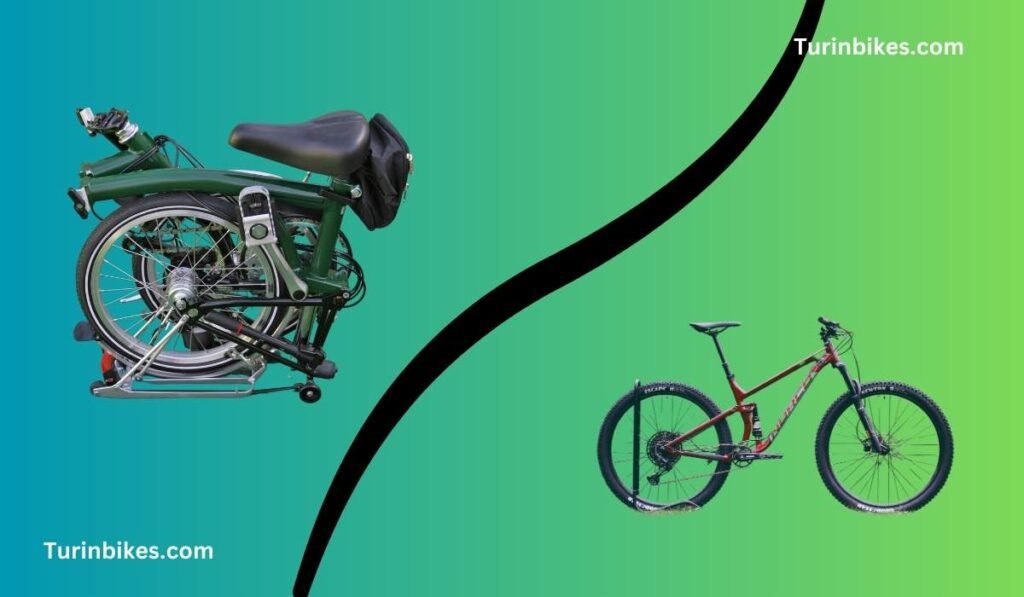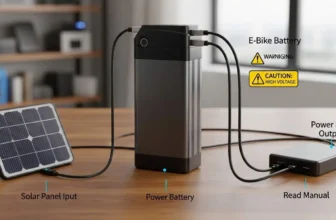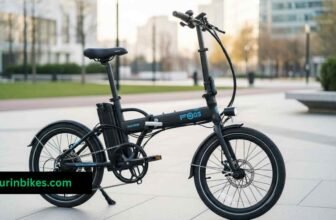
Hey there, bike lovers! Have you ever wondered about the mountain bike versus the super foldable one? Experts say it’s a hot topic! For the everyday commuter, foldable bikes are super handy and space-saving. But do they match the sturdy and adventurous feel of regular bikes? Dive in as we explore this relevant debate. We’ve made it super simple so everyone gets it. Whether you’re racing down a hill or zipping through city lanes, we’ve got the scoop on Folding Bikes vs Regular Bikes. Ready to roll?

Folding Bikes vs Regular Bikes: Step By Step Guide
What is a Foldable/Folding Bike?
A foldable, or folding bicycle, is like magic on two wheels! Imagine a traditional bike but with a unique trick: you can fold it up! Its smaller wheel size makes it perfect for those who commute daily. It’s easier to carry on trains or buses and fits snugly in tight spaces. Plus, with its unique wheel size, many folding bikes can even tackle off-road adventures. So, whether you’re zipping through city streets or taking a quick pedal in the park, a folding bike is your trusty companion.
A Little History of Folding Bike?
Did you know that folding bicycle isn’t a new idea? Though today’s models boast sleek and contemporary designs, the idea of a folding bike isn’t new. In earlier times, soldiers favored them for their ease of transportation. Over time, as cities grew and people needed better ways to commute, the folding bicycle became a favorite. Its ability to adapt, from off-road terrains to bustling city lanes, made it a hit. And with so many folding bikes available today, there’s one for every adventurer out there!

Pros of Folding Bikes:
- Public Transport Friendly: Folding bikes is a dream for those who combine a bike ride with buses or trains. They fold up neatly, making them easy to carry on public transport.
- Space Savers: With their folding mechanism, these bikes are helpful for those with limited storage space.
- Versatility: While they might not be the best folding road bikes, many models can rival hybrid bikes in performance.
- Electric Options: Just like traditional and road bikes, electric bikes are in the folding category, giving riders an extra boost.
- Adjustable Handlebar: The handlebar on many folding bikes can be adjusted, catering to every cyclist‘s comfort.
Cons of Folding Bikes:
- Speed Limitations: Due to their design, some argue that folding bikes are slower than their non-folding counterparts with larger wheels.
- Riding Experience: For some, riding a folding bike feels different than a non-folding bike, especially over longer distances.
- Durability Concerns: The folding mechanism can wear out over time if not appropriately maintained.
- Weight: Some folding bikes, especially electric ones, can be heavier than expected.
- Price: High-quality folding bikes sometimes cost more than traditional or hybrid bikes.

What is a Regular Bike?
A regular bicycle, often called a bike, is a two-wheeled vehicle powered by the rider’s pedalling. Unlike the compact folding frame of a foldable bicycle, a regular bike maintains a fixed structure, offering a consistent riding experience across various terrains.
A Little History of Regular Bikes:
The story of the regular bicycle dates back centuries. Before the rise of folding bikes like Brompton and Dahon, many bike enthusiasts relied solely on these traditional two-wheelers. They were the primary option for commuting, long rides, and off-road riding.
Pros of Regular Bikes:
- Ride Quality: With larger wheels like regular bikes, they often provide a smoother and more comfortable ride, especially on rough surfaces.
- Stability: The fixed structure and larger wheels ensure a stable riding position, making them suitable for various types of terrain.
- Durability: Regular bikes tend to be robust and can handle off-road riding and bumpier rides better than some lightweight folding bikes.
- Variety: Regular bikes come in various styles and designs, from e-bikes to terrain-specific models, catering to every rider’s needs.
- Cost: Many regular bikes are less expensive than their folding counterparts, especially when comparing similar quality models.
Cons of Regular Bikes:
- Portability: Unlike folding bikes, which are easy to transport due to their compact size, regular bikes require more effort, especially on public transport like the subway.
- Storage: If you live in a small apartment, finding storage space for a regular bike may be challenging compared to the easy-to-store shape of a folding bike.
- Weight: Some regular bikes, especially those made better for specific terrains, can be heavier and more challenging to carry up flights of stairs.
- Flexibility: While folding bikes offer the convenience of portability, regular cycles need this feature, making them less versatile for those constantly on the move.
- Space Consumption: In crowded urban areas or during peak commuting hours, a regular bike’s size might be less convenient than the compact size of a foldable one.
Final Thoughts: Folding Bikes vs Regular Bikes
In the great debate between folding bikes and regular bikes, it’s clear both have their unique charms. Folding bikes dazzle with their compactness and adaptability, perfect for city dwellers and those short on space. On the other hand, regular bikes promise stability and a timeless riding experience, catering to diverse terrains and adventures. Ultimately, the best choice hinges on your personal needs and cycling aspirations. Whether you’re zipping through urban lanes or exploring scenic trails, a bike out there is just right for you. So, gear up and let the journey begin!
Are foldable bikes good for hills?
Many foldable bikes handle hills well, especially those with multiple gears.
Is a folding bike good for food delivery?
Their compact size and manoeuvrability make them suitable for city-based food delivery.
Do folding bikes have gears?
Many folding bikes have gears to cater to various terrains and riding preferences.
Are foldable bikes easy to carry?
Absolutely! Their design allows for easy folding and portability, making them convenient to carry.
Are folding bikes as durable as regular bikes?
While designed for convenience, many modern folding bikes are quite durable, though regular bikes might excel in rough terrains.
Can I use a folding bike for long-distance rides?
Yes, many are comfortable for longer rides, though the experience might differ from a regular bike.
Do folding bikes have a weight limit?
Yes, each model has a specified weight limit. Always check the manufacturer’s specifications.

SEO Analyst & Bike Research Lead at TurinBikes
With over 5.5 years of experience in local & international SEO and affiliate marketing, Sachin has helped media sites and local businesses grow through data-driven strategies. He runs TurinBikes solo, creating transparent, evidence-based guides using thousands of verified user reviews, manufacturer specs, studies, and surveys – no personal ride tests, no sponsored bias. Focus: Honest recommendations for budget e-bikes and everyday riding needs. Full bio Click Here






